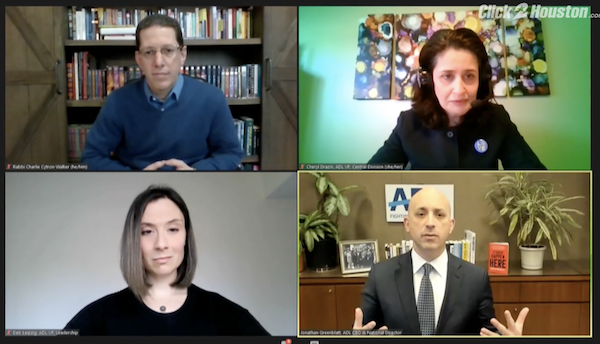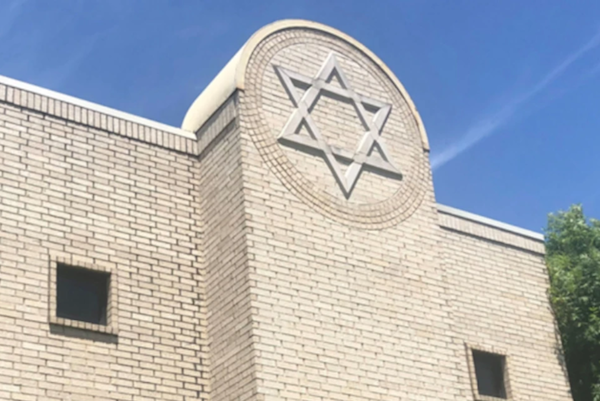Clockwise from top left: Rabbi Charlie Cytron-Walker of Congregation Beth Israel in Texas speaks with the Anti-Defamation League’s Cheryl Drazin, Jonathan Greenblatt and Deb Leipzig. (screenshot)
Rabbi Charlie Cytron-Walker was bustling around Congregation Beth Israel, in the Dallas suburb of Colleyville, Tex., getting ready for Shabbat morning services. There was a knock on the synagogue’s door and the rabbi welcomed a stranger who was looking for shelter from the unusually cold morning. Cytron-Walker prepared the man a cup of tea and made conversation.
“There were no initial red flags,” the rabbi recalled Jan. 20, in an Anti-Defamation League web event that included the director of the Federal Bureau of Investigation. The man exhibited no signs that he would be a danger, said Cytron-Walker.
“The sense of nervousness, the darting around, those kinds of things that you might expect,” were absent, said the rabbi. “He was calm, he was appreciative, he was able to talk with me all the way throughout, look me in the eye.… I didn’t have a lot of suspicions.”
The unexpected guest was, of course, Malik Faisal Akram, an armed British man who would take the rabbi and three congregants hostage in an 11-hour standoff on Jan. 15. In the end, for all the responders mobilized and crisis negotiators assembled, the incident ended when the rabbi threw a chair at the attacker and the four hostages escaped.
Cytron-Walker explained how he put together the man’s motivations by listening to his rantings and the conversations he was having by phone. Akram was seeking the release of Aafia Siddiqui, a convicted terrorist known as Lady Al Qaeda, who is incarcerated in an American prison not far from Beth Israel synagogue. The hostage-taker apparently subscribed to antisemitic ideas, including the belief that the United States would do whatever was necessary to save the lives of Jewish hostages and that pressure by Jews could lead to his demands being met. At some point, Akram became aware of Rabbi Angela Buchdahl, senior rabbi at Central Synagogue in New York City, and demanded to speak with her during the incident.
“I don’t know how or why he chose her exactly, other than the fact that he thought that she was the most influential rabbi,” said Cytron-Walker. “And I was thinking, this guy really believes that Jews control the world.… I tried to explain to him to the best of my ability that it doesn’t work that way.”
The rabbi credited law enforcement for their response, and spoke at length about the security preparations that synagogues and other Jewish institutions take, with the support of groups like UJA Federations, the Anti-Defamation League, the Secure Community Network and the FBI.
“We had a security plan in place,” said Cytron-Walker. “All of it was helpful, and yet, one of the things that we are aware of is that no matter how good the plan is, no matter how good the security is, these kinds of things can still happen.”
Christopher Wray, director of the FBI, expressed solidarity with not just those immediately affected by the incident but the entire Jewish community.
“We understand all too well that these kinds of attacks are terrifying and that they are not only terrifying to the individuals directly and physically involved, they are also terrifying for all the members of Congregation Beth Israel and, really, for the entire Jewish community, many of whom understandably worry about other threats still out there,” Wray said. “Our joint terrorism task forces across the country will continue to investigate why this individual specifically targeted Congregation Beth Israel on their day of worship.”
Neither Wray, nor any other individual on the livestream, addressed remarks by the FBI’s special agent in charge of the case. As the hostage-taking in the synagogue was unfolding, Matthew DeSarno told media that the assailant was “singularly focused on one issue, and it was not specifically related to the Jewish community, but we are continuing to work to find motive.” His remarks have been condemned as erasing the antisemitic motivations of the terrorist.
While none of the hostages was physically harmed, Cytron-Walker spoke of the emotional recovery that he, the other hostages and the broader community are undergoing.
“It’s going to be one step at a time for us,” he said. “We are doing the best we can to heal. We’re going to have services on Shabbat evening, we’re going to have services on Shabbat morning, we’re going to have religious school on Sunday and we already had a beautiful healing service on Monday night that was so meaningful – to actually see people, to be able to hug people.… But it’s one step at a time.… I’m getting the care that I need. I’m trying to make sure that I take care of my family and, at the same time, one of those pieces that we’re going to have to get past is that sense of fear.
“There was something traumatic that happened within the congregation,” he continued, “and we know that it’s not just our congregation that feels a sense of fear. It’s something that a lot of people and a lot of Jewish people in particular, our people, are living with.… We want to be able to go to services and pray and be together because one of the most important things is to be with one another within that sense of community. That’s needed right now more than anything else.”
Jonathan Greenblatt, chief executive officer of the Anti-Defamation League, moderated the online event.


